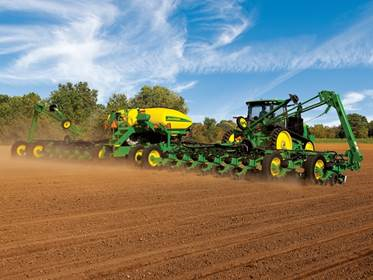Why Justice Wants to Block the Deere/Precision Planting Deal
Why Justice Wants to Block the Deere/Precision Planting Deal
September 1, 2016 12:00 PM
TAGS: Marketing, Overseas
December 18, 2014
By Alison Rice
AgWeb.com
Markets and News Editor
<iframe src=’http://admaym.com/nojsadserving.ashx?pbId=262&wsName=undefined&wName=undefined&bfDim=160×600&rank=1&clk=‘ width=’160′ height=’600′ frameborder=’0′ marginheight=’0′ marginwidth=’0′ scrolling=’no’></iframe>
The news that the Department of Justice has sued John Deere to block its $190 million purchase of Precision Planting caught the ag world by surprise on Wednesday, given the lack of action on other major ag mergers, like ChemChina’s purchase of Syngenta and consolidation in the livestock world.
Their reason: The deal could lower competition and raise costs for farmers.
“Overall, farmers have benefitted from the innovative product offerings, aggressive discounts and promotions, and lower prices that have resulted from the intense head-to-head competition between Deere and Precision Planting to sell high-speed precision planting systems,” Justice said in a legal filing released yesterday.
That document, a complaint filed in U.S. District Court for the Northern District of Illinois, Eastern Division, provides important insights into the antitrust division’s thinking about the Deere/Precision Planting deal, which was announced in November.
Here are Justice’s top concerns, according to the complaint. (Click here to read the full document.)
1. The combination of Deere and Precision Planting would constitute a monopoly, given that the two firms’ market positions add up to 86% of all high-speed precision planting sales in the U.S., according to Justice.
2. Precision Planting, which offers less retrofit options for existing planters, has been a significant competitor in the marketplace for Deere. “A farmer who might otherwise spend over $150,000 to purchase a new ExactEmerge planter from Deere could achieve the same results at one-fifth the coast by upgrading a conventional planter with Precision Planting’s retrofit components,” the complaint says.
3. Justice sees an independent Precision Planting as an important force for lower prices in the high-speed planter market and thinks that Deere does too. “In evaluating the benefits of acquiring Precision Planting, Deere estimated that eliminating competition from Precision Planting would allow it to avoid cutting its ExactEmerge prices by 5% to 15%,” according to Justice. The agency also says that “Deere calculates that the ‘strategic value’ of the acquisition—that it would retain by not having to compete with Precision Planting—ranges between $70 million and $210 million.”
4. There are high barriers to entry for the high-speed precision planting market. Both Deere and Precision Planting invested years in developing their high-speed seed delivery cartridges, and “strong patent protections, in part, ensure that Deere and Precision Planting are the only two firms offering these seed delivery cartridges,” the complaint says.
5. The combination of Deere and Precision Planting would create an unfair competitive situation for other machinery companies like Case and AGCO, which have been developing a factory-install business with Precision Planting. “If the acquisition were consummated, Deere would likely set the price, technology, and go-to-market timing of high-speed precision planting systems supplied to competitors to not undercut its planter sales,” the complaint says. “This strategy would likely harm Deere’s rivals, entrench Deere as the dominant provider of high-speed planting systems, and limit competitive choices available to farmers.”
In a joint statement released Wednesday, Deere and The Climate Corp. disagreed with Justice’s findings. “Competition in precision agriculture is strong and growing in all of these channels as companies around the world continue developing new technologies. The acquisition will enable broader access to these advancements by ensuring farmers the choice to either buy new machinery or retrofit older planting equipment with the latest new innovations,” the statement said. “When the transaction is finalized, Deere will preserve Precision Planting’s independence in order to ensure innovation and speed-to-market and will invest in additional innovation efforts at Precision Planting to benefit customers.”

